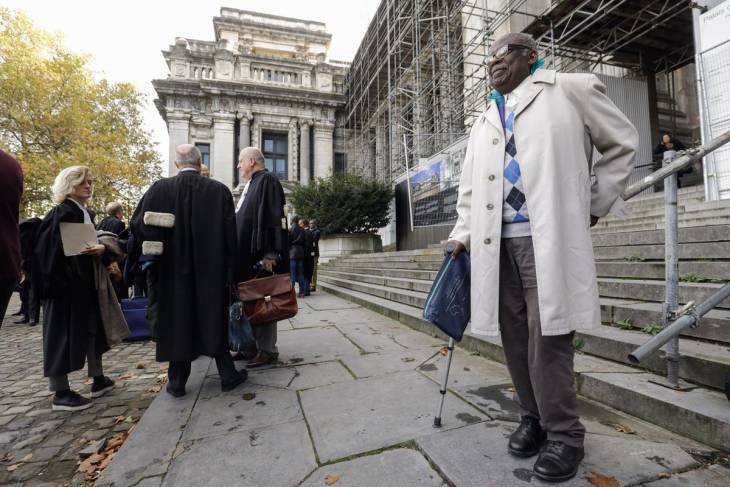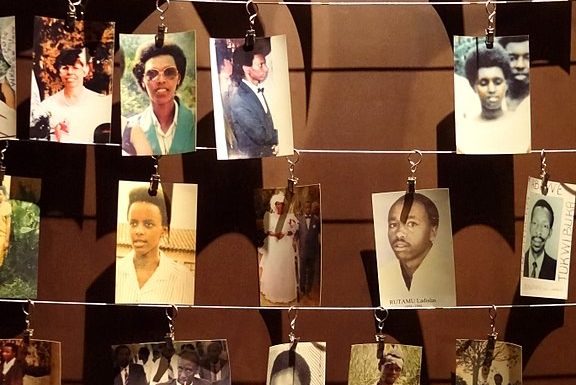The man accused of causing an "incalculable" number of deaths, including that of a Belgian citizen, during the 1994 Rwandan genocide stood before a Brussels court on Friday and said all accusations made against him were false.
"They are false witnesses — I shall wait to be confronted with them," the accused, a former top Rwandan official, told the court repeatedly on 8 November, as a slew of grim and incriminating testimonies were read aloud to him.
On the second day of Fabien Neretse's trial, the president of Brussels' court of assizes grilled the exiled Rwandan for roughly ten hours before having to interrupt and postpone the hearing after the accused became unwell in court.
Neretse is being charged with causing the death of 13 people, including that of his neighbour, a Belgian citizen called Claire Beckers, of her Rwandan-Tutsi husband and of their teenage daughter during the Hutu's genocidal campaigns against the Tutsi ethnic group.
Throughout his questioning, the defendant alternatively admitted to being "surprised" or "puzzled" at accounts given by those who accused him of using his political influence to actively participate in the slaughter of between 800,000 to a million people.
A Hutu himself, Neretse is also accused of having propped up, financed and directed a ruthless branch of the Interahamwe armed militia in his hometown of Mataba, for which he is accused of being accessory to an "incalculable" number of additional deaths.
Neretse said he was baffled by several testimonies telling of how he denounced the attempt of three families, including Beckers', to escape the capital Kigali in the early days of the genocide, claiming he held good relationships with his neighbours.
A string of testimonies centred around a secondary school founded by Neretse in his home village of Mataba, to which he fled following the killing of his neighbours in Kigali.
Throughout the hearing, Neretse systematically struck down more than a dozen testimonies describing his close ties with government officials in Mataba and his role in stoking or actively directing killing sprees in his hometown.
Witness accounts said guards hired by Neretse for school security were in fact armed and trained to become Interahamwe militiamen, with several accounts calling them "the Interahamwe of Neretse."

Neretse, now 71, is accused of playing a central role an "incalculable" number of killings, including that of a Belgian-Rwandan family. Credit: Belga
Related News
- Trial on genocidal killing of Belgian-Rwandan family kicks off in Brussels
- Rwandan tried for 'unspeakable' crimes in first-ever genocide trial in Belgium
"[A witness] said that he could see, from his house, located close to yours, killing sprees carried out in the surrounding hills," the court president said after Neretse declared that he had not witnessed any massacres in Mataba, which he said was founded by his father in 1927.
The accused also dismissed the account of a witness who called Neretse the "lord" of Mataba and who said: "if he had said no to something, it would not have been done."
Several accounts additionally recount how Neretse was among town authorities at a public meeting at which Mataba authorities called on the population to "kill Tutsis and raze their homes to the ground," claims which Neretse denied, saying town officials had simply "shared their governing program."
The court also read out a host of testimonies from witnesses of two murders which Neretse is accused of being directly involved in, by assisting militiamen in capturing Anastase Nzamwita and Joseph Mpendwazi, killed in the vicinity of Mataba.
But as the court resumed the questioning of the accused on Tuesday after being forced to cut it short the previous Friday, Neretse told attendants at the trial that he was "afraid of the militaries" and that if he "hadn't come to Mataba, there would have been dozens of deaths."
After their clients' questioning on Tuesday, Neretse's defence denounced the court for using only the evidence collected by the prosecution in the questioning of their client, Le Soir reports.
A request by Neretse's lawyers for the court to read out exculpatory evidence was ultimately dismissed by the court after it went into deliberation for around two hours.
On Friday, Martine Beckers —whose determination to obtain justice for the murder of her sister, brother-in-law and niece paved the way for the first trial on genocidal crimes in Belgium— is expected to testify in court in the presence of the man she sees as responsible for the murder of her family.
Gabriela Galindo
The Brussels Times

